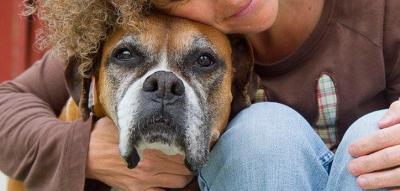
Senior Dog and Cat Care: Common Health Issues
Ralph Waldo Emerson famously wrote, “All diseases run into one: old age.” This statement applies to both people and pets; after all, our pets age faster than we do. Though there is no perfectly accurate human-to-dog or human-to-cat age comparison, it’s can be startling to realize that a 3-year-old pet is roughly equivalent to a 30-year-old person.
Just like older people, senior dogs and cats can become afflicted with myriad diseases. Here are some common health issues to watch for and a few suggestions to help senior pets age gracefully.
Vision problems
Vision problems are common in older pets. Watch for changes in the appearance of your pet's eyes, such as dilated or constricted pupils, squinting, or cloudiness. Also, monitor your pet for vision deficits at night, and note whether they have trouble navigating or bump into objects or furniture.
If you notice any of these things, it’s time for a visit to your veterinarian. Your vet will perform an ophthalmic exam and might refer you to a specialist in animal ophthalmology.
Hearing loss
Hearing loss is another common problem in senior dogs and cats. Sometimes it is challenging to determine whether our pets have hearing loss or they're just ignoring us. Some signs that a pet might not have optimal hearing are startling easily when approached from behind, not reacting to the doorbell or other sounds that they previously responded to, and going the wrong direction or turning the wrong way when called. Again, if you are noticing these things, a visit to your vet is important.
Home starts with you
Additional ear problems — such as excessive wax buildup in the ear canals or untreated ear infections — could be contributing to hearing loss. Even hair buildup in the ears in breeds that are predisposed can be a contributing factor.
Cognitive dysfunction
Cognitive dysfunction is a condition associated with brain aging. This condition often begins with subtle changes, but the first thing many people notice is disorientation and confusion. The dog or cat becomes confused easily, even in familiar environments. They might pace aimlessly or get stuck in corners. Sometimes house-training deteriorates, and pets urinate and defecate inappropriately. You also might notice changes in the animal’s sleep cycle and random vocalization.
If your pet is displaying these behaviors, consult your veterinarian. Your vet might perform a neurological exam and check your pet for other diseases that exhibit similar signs. There are some new drugs that your vet might prescribe to help with this disease. They might also recommend dietary changes; some improvement has been noted in pets consuming diets high in antioxidants and betacarotenoids, which are found in fruits and vegetables, as well as essential fatty acids.
Kidney disease
Kidney disease also commonly affects older pets, particularly cats. In the early stages of kidney disease, you might not see any signs of illness in your pet. As the problem progresses, you might begin to be aware that your pet is drinking more water than normal and urinating more. You might also notice weight loss, vomiting, lethargy, and mouth ulcers or odor.
If your pet has these signs, your vet will check blood work and a urine sample. Your vet might recommend a special diet and fluid supplementation. There has also been promising research on the benefit of omega-3 fatty acid supplementation in pets with kidney disease.
Cancer
Older pets have a higher incidence of growths and tumors. Keep vigilant watch on any lumps and bumps on your older animals and have them checked by your vet annually.
If you see rapid increase in the size of tumors and growths, or masses that suddenly appear, have your vet check these earlier rather than later, as it could indicate a more severe form of cancer. If your pet starts losing weight or has a marked lack of energy or appetite, cancer screening tests and an exam by your vet are recommended.
Arthritis
Arthritis is the main cause of chronic pain in senior dogs and cats. An older pet might have intermittent pain or stiffness after rigorous activity. You might notice your pet having difficulty getting up and down, alterations in gait, and/or limping. If you see these signs, talk to your vet about taking radiographs to evaluate your pet's joints for arthritis. Consider glucosamine supplementation, as well as chondroitin sulfate, hyaluronic acid, and essential fatty acid supplements.
If your pet is overweight, losing some pounds often improves arthritis pain dramatically. It is also important to continue moderate exercise because it maintains your pet’s muscle tone, preserves range of motion in joints, and actually relieves pain by stimulating specific nerve fibers. Ask your vet about integrative therapy options, such as animal chiropractic care, acupuncture, and laser therapy.
